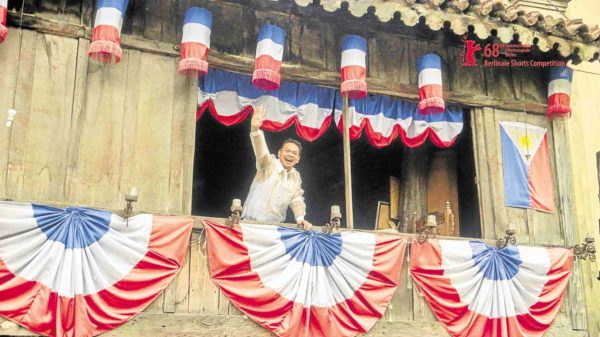Barangay Babylon goes to Berlin
For filmmaker Keith Deligero, persistence has paid off, big-time. To be more accurate, being a persistent prankster has taken him places—most notably, to this year’s Berlinale short film competition, ongoing in Germany until Feb. 25.
Three years ago, he submitted material to QCinema fest. “But it was rejected on the first round. It was ‘experimental’ or just absurd, I guess.”
In the 2017 edition of QCinema, he “lifted” the material’s third act and turned it into a short film. “I submitted it,
almost as a prank. But this time, I got lucky.” That was how “Babylon,” the short film, was born.
He admitted that he used to prefer making full-length features, like his Cinema One entries “Iskalawags” and “Lily,” over short films. “Why waste time, effort and ideas on a short film when it can be feature-length? That was my thinking then.”
Article continues after this advertisementBut his Berlin entry, “Babylon,” was a personal project. It commemorated his first decade of making films with his loyal team.
Article continues after this advertisementWhile watching the short film on the big screen, though, he was hit with a realization. “I can interpret it as a ‘prank call’ to our ‘big beautiful country.’”
That “Babylon” has political undertones can’t be ignored. It’s about two girls who travel back in time, to assassinate a barangay captain. Is the mythical Barangay Babylon a mirror image of our big, beautiful country?
He has a simple wish when the film premieres in Germany. “Despite the tendency of ‘Babylonians’ to agree to disagree on so many things, I hope foreign viewers will see the ‘big beautiful country’ beyond Tito Loy’s barangay.”
He admitted that traveling to Berlin is “more expensive” than making the short film itself. “We are working on going there and hopefully, we will get there and bring home some bears.”
Alas, he remains persistent —again that word! After all, Deligero is one of the staunchest proponents of Cebuano cinema hereabouts. “I can be wrong … [but] being local is the best way to stand out internationally.”
He elaborated: “Being local is being a singular and authentic voice in a world full of noise. There are more of these voices from the different corners of our archipelago and I think we should listen to them more.”
As audience members, he asserted, “we should not just wait for films (or any form of art) to be served to us via the mainstream and alternative platforms. There are so many movements in art, music and film happening in places that we would not expect.”
He has a theory on Cebuano cinema’s considerable growth in recent years. “Because we make authentic cinema with very local voices consistently, audiences are now taking us more seriously. In the near future, the term ‘regional’ will become part of history and everything will be collectively called Philippine cinema.”
But how can we encourage more young filmmakers from the regions to tell their stories? “I always advise the youngsters who want to join our Binisaya Film Festival to tell stories that only they can tell,” he said. “To stop making the films their idols would make or have made.”
In the meantime, real-world problems still get in the way.
“I have to get back to work; bills need to get paid,” he conceded. “I have seven films that are yet to be made. I hope this Berlin opportunity would spark interest in getting these films funded. There are two or three blockbusters in there somewhere.”
The hopeful dreamer in him remains defiant, though. “I hope we get to make the feature-length version of ‘Babylon’ and maybe premiere it in the main competition of Berlinale next year (laughs).”
Hope is a persistent prankster.
